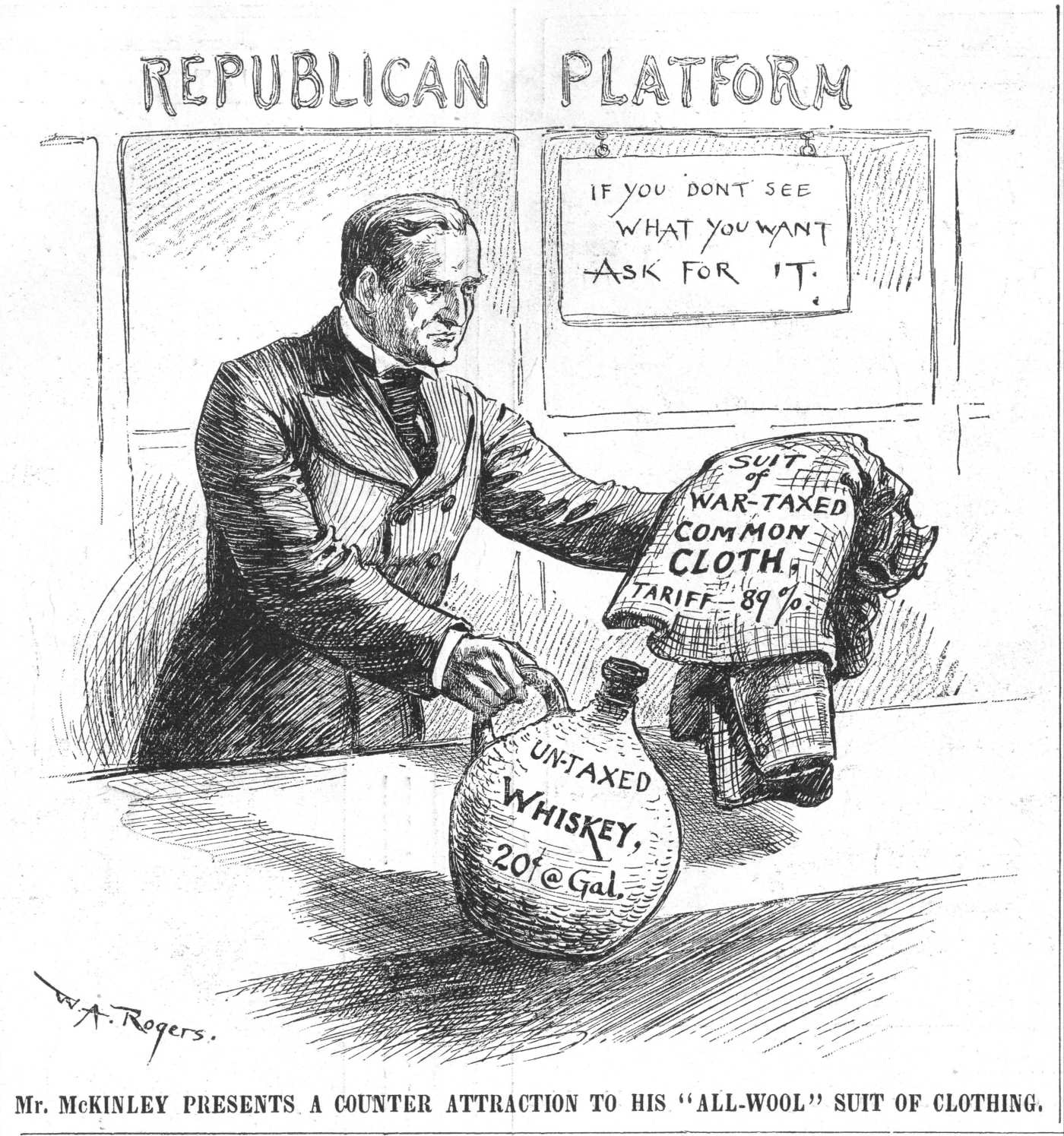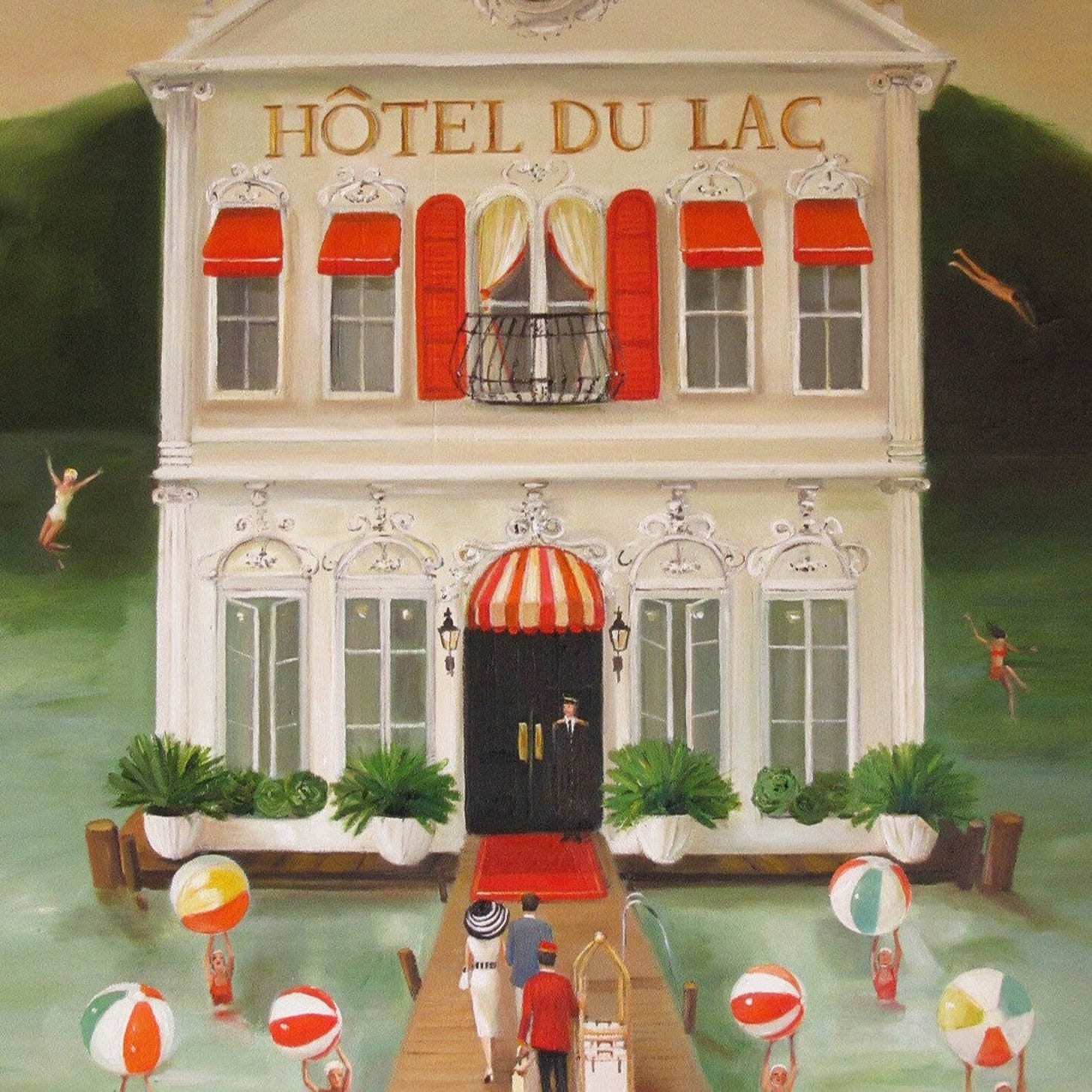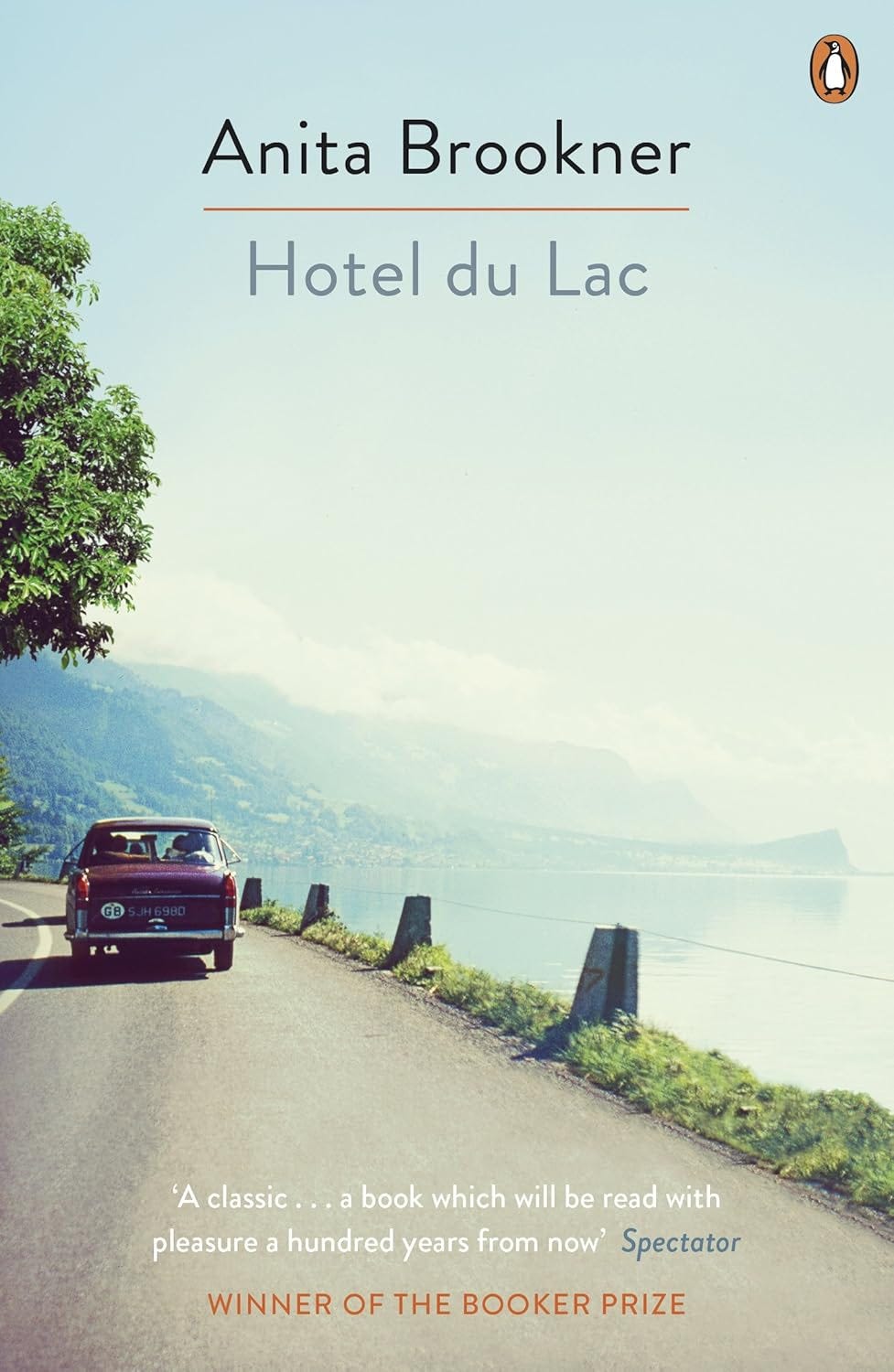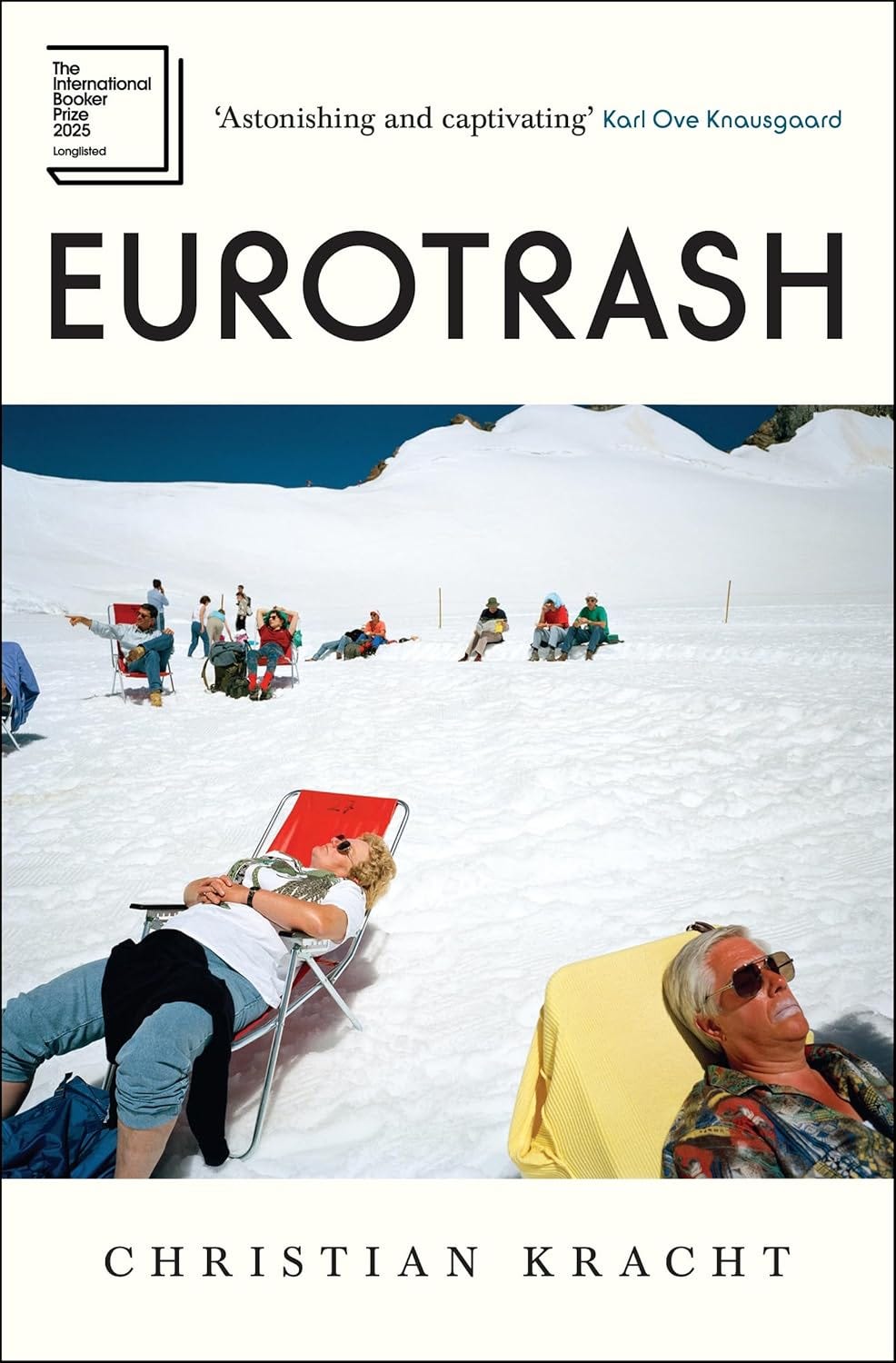Good afternoon!
This past week, I read two literary fiction novels set in the Swiss Alps—Hotel du Lac by Anita Brookner and Eurotrash by Christian Nacht—that I found through the Booker library. Hotel du Lac won the Booker Prize in 1984, and Eurotrash was longlisted for this year’s International Booker Prize. Let’s get into it.
read📖→
Hotel du Lac by Anita Brookner
Hotel du Lac follows an English writer on vacation in Switzerland during the off-season.
Overview: Edith Hope, “a writer of romantic fiction under a more thrusting name,” has decamped to the Hotel du Lac on the shores of Lake Geneva after getting caught up in a scandal in England. While the hotel attracts a “well-to-do” clientele, it lacks amenities:
As far as guests were concerned, it took a perverse pride in its very absence of attractions, so that any visitor mildly looking for a room would be puzzled and deflected by the sparseness of the terrace, the muted hush of the lobby, the absence of piped music, public telephones, advertisements for scenic guided tours, or notice boards directing one to the amenities of the town.
Brookner follows Edith as she writes during her self-imposed exile and socializes with other guests. She meets Mrs. Pusey (a wealthy widow), Pusey’s daughter Jennifer, Comtesse de Bonneuile (an aristocratic elderly lady with a “pug face”), Monica (whose husband is threatening to divorce her if she can’t conceive a child), and Mr. Neville (a businessman whose wife left him for a much younger man).
Opinion: Hotel du Lac is like a mid-century Swiss version of The White Lotus. I couldn’t actually tell what period this book was set in. While it was published in the 1980s, many cultural references seem to be from the 1950s.
Brookner paints the Swiss Alps in clear and vivid prose: “The lake was utterly still; a solitary lamp gleamed above her, turning the limp leaves of a plane tree to brilliant emerald.” Brookner excels at describing the mundane activities that consume Edith’s time—namely, sleeping and sitting around:
The café with the clouded windows, now transparent and bathed in afternoon light, was almost empty. Seated at a silent table, Edith closed her eyes momentarily in a shaft of sunlight and tasted pure pleasure. Time dissolved; sensations expanded. She drank coffee, still too highly charged with vicarious emotion to eat, and then sat back in her chair, her eyes closed once more, savouring the reward of rest after her obscure and unnoticeable exertions.
While I enjoyed Brookner’s writing style, the pacing was a little slow. Not much happens. I typically enjoy setting or character-driven books, but there wasn’t quite enough happening here to hold my interest. I wanted sharper cultural commentary or more character development.
Brookner’s cultural observations are, at times, funny and astute, like when she describes the quietly domineering politeness of the Puseys, who take Edith under their wing. Most of Mrs. Pusey’s sentences “began with the words ‘Of course’, they had a range of tranquil confidence which somehow occluded any attempt to introduce an opinion of [Edith’s] own.” However, these moments were scarce and relatively tame. I wanted Brookner to take the social satire a bit further.
Criticism aside, this book is ultimately about finding meaning in a quiet life. As Edith remarks to another guest: “My idea of absolute happiness is to sit in a hot garden all day, reading, or writing, utterly safe in the knowledge that the person I love will come home to me in the evening.” Same.
Overall: Hotel du Lac is a well-crafted novel with interesting characters. While I enjoyed this book, I likely wouldn’t jump to recommend it given the slow-moving plot.
Rating: 3.6/5
Genre: Historical Fiction (Literary)
Notable prizes/book clubs/lists: Booker Prize Winner (1984)
Page count: 184 pages
Audio: 5 hours
Movie/TV pairings: The White Lotus
Eurotrash by Christian Kracht (translated from German by Daniel Bowles)
Eurotrash is a work of autofiction about a novelist who goes on a road trip through Switzerland with his eighty-year-old mother, who has just been discharged from a psychiatric institution.
Overview: Eurotrash is narrated by its protagonist, Christian Kracht, who shares the same name as the author and has, like the author, written a book called Faserland. The book opens with Kracht visiting his mentally ill and elderly mother in Zurich. She washes a cocktail of prescription drugs down with vodka. She prefers to chew her Ambien, which she takes throughout the day: “They get into your bloodstream faster. They’re absorbed through your gums.” Kracht and his mother hire a cab and go on a quixotic road trip, revisiting places from his childhood.
Kracht’s narcissistic mother constantly gets the upper hand, despite being ill. “You were never there for me,” she says. “How dare you speak to me like that? Where does this anger even come from?” As Kracht observes, “She was an expert manipulator. That was her epic, incredible art, which I had known for decades; she lied and twisted things in such a way that everyone believed everything she said.”
Eurotrash is filled with eccentric, dark humor. Kracht’s feelings on the road trip and his childhood are complex. He had multiple relatives that were Nazis, and his family made their fortune through weapons manufacturing. Kracht’s “childhood and youth were permeated by arrogance and hyperbole and fraud and degradation, by dead money.”
But he finds humor in this. The two try to give away money in an ill-conceived plan to rid themselves of this “dead money.” At one point, they take a gondola up to a viewpoint. They try to give away the tens of thousands of Swiss francs that they have been carrying around in a plastic bag to three Indian ladies. Confused, the ladies refuse the cash:
And suddenly, as these things sometimes happen, a rush of wind kicked up out of nowhere. A gust blew up out of the deep chasm to our right—you could absolutely see this wind passing through the barrier railings and churning up powdery snow, scraps of paper, and inexplicably, some oak leaves, too. A vortex hovered in the air, a little whirlwind, and then the gust swept up over the table like an invisible hand, wiping, no, tearing the entire stack of money away. The colorful thousand-franc bills twirled about in the thin air and fluttered down the abyss, just so. We all looked at the banknotes vanishing down into the rocky ravine, frozen solid. No one attempted to catch one.
Opinion: I chose to read Eurotrash because it was longlisted for this year’s International Booker Prize. The oddball premise and cover seemed too tempting to pass up.
Eurotrash is a well-written, eccentric satire. Kracht skewers the privileged class, critiquing the people from Bern (and their “ossified insistence on their own provinciality”), Zurich (“a city of moneygrubbing middle management and depressing hustlers and reserve lieutenant”), and Geneva (a “dreadful, phony, ice-cold Protestant city, full of poseurs and braggarts and bean counters”). Admittedly, these observations might not resonate with a broader audience who doesn’t understand Swiss culture or privilege.
While not everyone might understand Kracht’s cultural observations, the complex mother-son relationship is really the heart of this book. Kracht deftly shows his strained relationship with his mother through sharp dialogue. He finds the humorous side to his mother’s narcissism while also reflecting more seriously on his mother’s pain and trauma. He asks:
What it had really been like being married to my father? What had it really been like living with her father? Had the SS identification card and the Golden Party Badge and the various torture chambers and the grandiose, decades-long, centuries-long silence, that corrosive, incisive, intransigent, irascible silence, been merely a dream, a seemingly never-ending, pedestrian, ghastly dream?
Eurotrash is a work of autofiction, and it’s not evident what is real. At one point, Kracht discusses the storyline of one of his other books, Faserland. He states: “Yes, but that was fictional. This here is real.” Ultimately, I don’t think it really matters—the book might even be more realistic than Kracht’s own life as it depicts the emotional truth of this mother-son relationship.
Overall: Eurotrash is not for everyone, but I highly recommend it to someone who likes eccentric literary fiction.
Rating: 4/5
Genre: Literary Fiction
Notable prizes/book clubs/lists: Longlisted for the International Booker Prize (2025)
Page count: 192 pages
Audio: 4 hours 16 minutes
consumed 🎬🎧🗞️→

The economic news this past week has been difficult to process—it’s an “astonishing act of self-harm.” I just started reading a biography on William McKinley, who Trump seems to idolize.
A genetics company is working to bring back extinct animals. So far, they’ve birthed three dire wolves, named Romulus, Remus, and Khaleesi.
cooked 🍳→
Greek-style flounder, grilled vegetables, and a Greek chopped salad.









